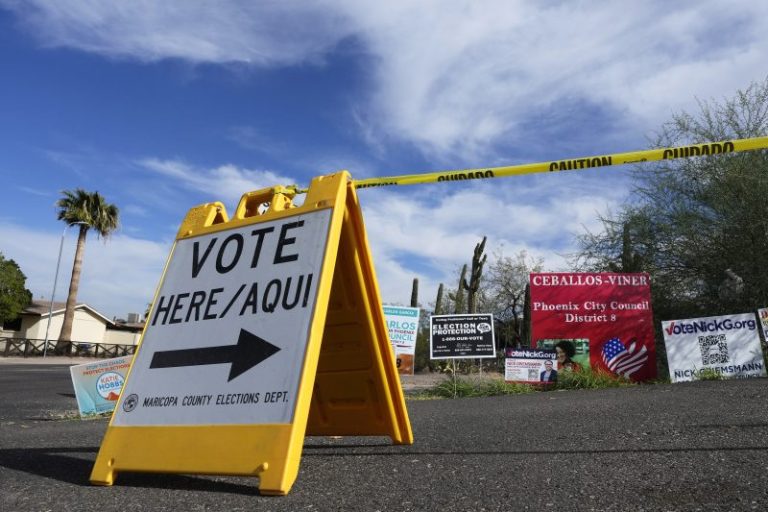Arizona state law mandates that counties certify their election results no more than 20 days after an election. That was Monday, so, as the day progressed, county officials finalized the outcome of the 2022 midterm contests one by one.
Cochise County didn’t. There, the two Republicans on the three-person board of supervisors agreed to table finalization of the results, quickly spurring a lawsuit from the state. Officials in Mohave County considered a similar act of rebellion, with one Republican on that county’s board claiming that he was only voting to certify the results “under duress.”
This is the evolution of the right’s effort to reject elections in which their candidates lose — or simply to reject elections in general. Finalization of election results comes only with the imprimatur of official recognition, so Republican officials in some places are simply refusing to grant that recognition. Since Donald Trump began his furious effort to overturn the results of the 2020 presidential election, sympathizers at the county level have repeatedly tried to take elections into their own hands.
The immediate trigger for the Cochise County vote was that Republican gubernatorial candidate Kari Lake has engaged in a Trumpian effort to overturn her own electoral loss. Lake was defeated by Arizona Secretary of State Katie Hobbs by about 17,000 votes, half a percentage point. In the weeks since, she and her allies have encouraged a broad campaign to raise questions about how voting was conducted and about the legitimacy of the results. There were glitches in voting in Maricopa County, the state’s most populous, but there’s no indication that the problems disenfranchised voters or that they disadvantaged Republicans in particular.
But that isn’t Cochise County, which runs its own elections. There’s no indication that anything unusual or suspect happened there or in Mohave County. In each county, the vote margins were slightly different than in the 2020 presidential contest, with more Republican counties (higher up on the chart below) shifting to the left and more Democratic counties shifting to the right. (This is in large part a function of not having third-party candidates on the ballot.) That black dashed line shows the trend across the state; neither Cochise nor Mohave counties stand out as exceptions to the statewide trend.
In other words, the only obvious reason to reject the results in Cochise County — which Lake won by nearly 20 percentage points — is to object to the election results generally. By all appearances, it’s an attempt to upend Lake’s statewide loss.
Other counties have used this tactic of refusing to certify election results as a way to suggest that elections were somehow suspect or tainted. Doing so both reflects and reinforces a narrative that has gripped the right-most segment of the GOP since 2020: Elections are necessarily suspect. On Monday, officials in Pennsylvania’s Luzerne County (just southwest of Scranton) deadlocked on a vote to certify results. One Republican on the body tasked with approving the results insisted that she couldn’t vouch that the election had been conducted freely and fairly. Trump won the county in 2020 by 14 points; Mehmet Oz won the Senate race there earlier this month by nine.
Earlier this year, the Republican-led supervisory board in Otero County, N.M., refused to certify election results from the state primary. This situation was more complex, following a failed effort by the board to “audit” the 2020 election results in the county (which Trump won by a wide margin) out of putative concern over electronic voting machines — a concern directly downstream from Trump’s efforts to overturn that election. One of the members of the board in Otero County is Couy Griffin, a fervent Trump supporter who was convicted of misdemeanor trespassing in the U.S. Capitol riot. Ultimately, the courts forced Otero County to certify, as is likely to happen in Arizona.
Those are only the post-2020 efforts. That year, Trump and his allies engaged in a widespread effort to pressure officials not to certify election results, almost uniformly without success. One exception was in Wayne County, Mich., home of Detroit. There, two Republicans on the elections board (including one who had shared false claims of fraud on Facebook) blocked initial certification of the results, earning Trump’s public praise. One of those Republicans put a very fine point on her concerns: Perhaps all of the results except those from heavily blue (and Black) Detroit could be certified?
There’s no question that it’s appropriate for elections boards to delay certification of elections when legitimate concerns arise. In 2018, after questions emerged about absentee ballots submitted for a Republican candidate in North Carolina, the state’s board held off on certifying the results of a congressional contest. A new election was held, with Republicans retaining the seat. There’s also no question that campaigns have in the past asked that boards hold off on certifying results, as the campaign of Al Franken did in Minnesota in 2008. In that case, the certification of the initial vote went forward, but a recount determined that Franken was the winner.
What appears to be novel here is elections officials themselves refusing to certify election results thanks to unproven theories or out of apparent frustration about outcomes. If election denialism is an insistence that the losing candidate actually won, this is election rejection: a seemingly petulant effort to block the results in the first place.
The gubernatorial election in Arizona was close, as might be expected following a hard-fought contest in a purple state that narrowly backed Joe Biden in 2020. In Maricopa County, things didn’t run particularly smoothly, but there’s no indication that the results were affected. In fact, Lake’s vote margin in the county was better than Trump’s. But those more interested in holding power than respecting the will of the electorate continue to pressure officials to subvert the will in favor of that power.
In some cases, it seems to work.

